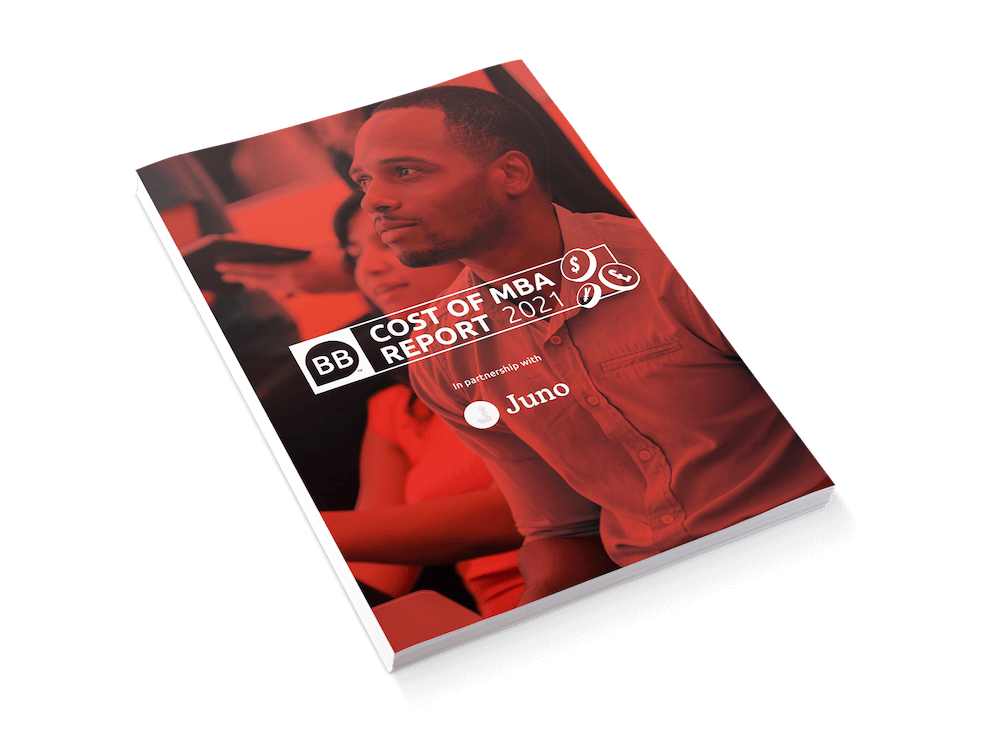For those applying for business school, the cost of an MBA degree will have crossed your mind. The BusinessBecause Cost of MBA Report breaks down every expense—from tuition and application fees to housing and healthcare—revealing how much it actually costs to do an MBA at a top-25 business school.
At the top end, US schools MIT Sloan and Stanford tally up the highest total costs, while NUS Business School in Singapore offers the least expensive top MBA.
But the coronavirus pandemic has had a significant impact on the global economy, and costs of an MBA are likely to have been impacted too. So how might coronavirus impact the cost of your MBA?
Impact on tuition and application fees

Cambridge Judge Business School, where all lectures will be online next academic year ©Poohz
Tuition remains the most significant contributor to the overall cost of an MBA. At top US schools like MIT Sloan and Stanford, this stands at around $150k over two years, around 65% of the total cost, according to our research. At UK schools Oxford Said Business School and Cambridge Judge Business School, tuition accounts for nearly 80% of the total cost of studying.
But since the coronavirus outbreak, MBA programs have changed considerably—moving entirely online in the short term, and potentially towards blended formats in the long term.
Cambridge Judge, for example, announced that lectures would be online for the duration of the 2020/21, with some smaller in-person classes.
With these changing formats, many schools have come under pressure to refund or reduce tuition costs. At Stanford, an online petition demanding refunds for spring semester tuition was signed by 80% of the MBA class; similar petitions have surfaced at the Wharton School and Kellogg School of Management.
MBA360 admissions consultant Barbara Coward expects to see tuition freezing from many of the top schools. There will also be a renewed focus on added benefits to ensure MBA students are getting more for their money.
“Instead of a decrease in tuition, students will look for schools to provide added value through additional guest speakers, expanded career services, and opportunities to connect with students at peer schools, for example.”
Impact on living costs
With lockdown still in place in many locations, and international travel still under restriction, business schools are likely to see candidates choose domestic study over travelling abroad.
This could have severe financial implications for business schools, who rely heavily on international student fees to survive. UK universities have warned of a “cash black hole”, left by a significant decrease on the 120,000 Chinese students (among other internationals) less likely to come to the UK to study.
For students, however, studying domestically may come with a reduction in costs.
Living costs, the second biggest contributor to the total cost of an MBA, is largely constituted by accommodation, especially given the price of rent in big cities like New York and London. But for some domestic students, living at home with parents or relatives could be an attractive option, diminishing costs considerably.
This could also reduce costs for things like healthcare. Domestic students at UK or other European schools have access to free healthcare, compared to costly health cover in the US.
Given the uncertainty around the future of the pandemic, and how long lockdown will last, costs may be saved elsewhere. Extra-curricular activities, socializing, and travelling are all rarer for online students, while even full-time students may be less inclined to spend on these add-ons.
Impact on financial aid

©spukkato
Wider economic factors will also have an impact. As well as international travel bans, weaker exchange rates are making international study in some locations less enticing.
Concerns over the cost of an MBA increased between February and April 2020. According to a recent candidate survey by the Graduate Management Admission Council (GMAC), those who answered that ‘costs may slightly or moderately impact their decision to study’ increased from 56% to 61% for domestic students, and up to 64% for international students.
“The global scope of COVID-19 impact on the world economy means that financial considerations will rise in importance for prospective students in the immediate short term,” says Rahul Choudaha, director of industry insights at GMAC.
“Schools need to address tuition cost concerns for a segment of price-sensitive students," he continues.
One way schools might consider this is through offering more generous and extensive scholarships to students for whom tuition fees might be a barrier. Many schools extended, and continue to accept, scholarship applications for the coming intake.
Scholarships will likely be more competitive, with more students requiring financial assistance, but Barbara imagines this will trigger a renewed focus on fundraising. “Deans will be back on the road and connecting with alums in person as soon as they can.”
Some schools have also taken steps to waiver application fees as a way to encourage interest. 38% of schools surveyed by GMAC reduced or waived their application fees amid the pandemic.
Organizations which help students fund their studies are taking extra steps to ensure that their financial support they offer is responding to the crisis. Prodigy Finance, a leading business school loans company, is freezing interest on its loans for the next three months. For those whose program end dates have been extended, Prodigy is pushing back the date when applicants have to start repaying their loans.
Why cost shouldn’t impact your decision
Cost has always ranked highly among reasons influencing business school decisions, and that's truer now than ever. But immediate cost shouldn’t overshadow long term gains.
“One of the challenges with cost is that it is immediate and easy to measure. However, benefits are over a more extended period and also less tangible,” Rahul explains.
Business school remains a long term investment with almost guaranteed payoffs. Those who studied and graduated from business school around the time of the last global financial crisis will testify to the enduring impact their MBAs had on their careers and lives to date.
This article is based on our 2020 report.
For the latest data, download our BusinessBecause Cost of MBA Report 2021




